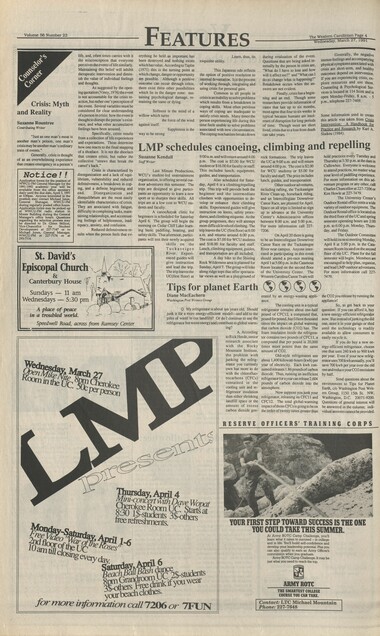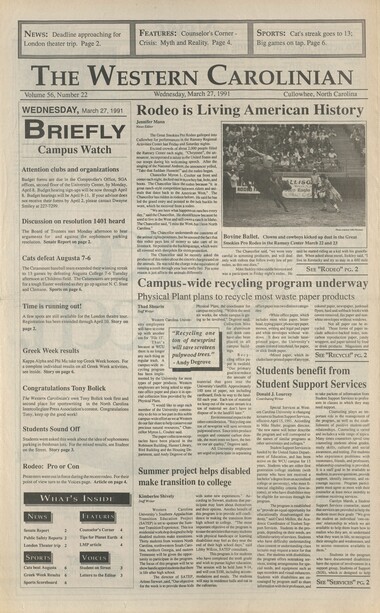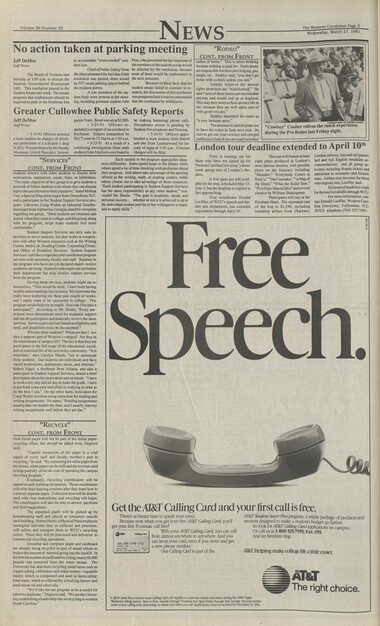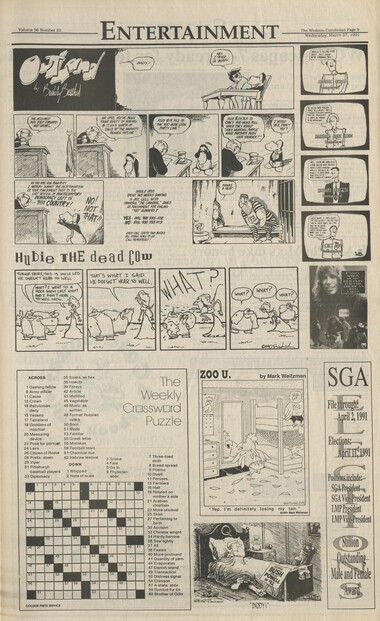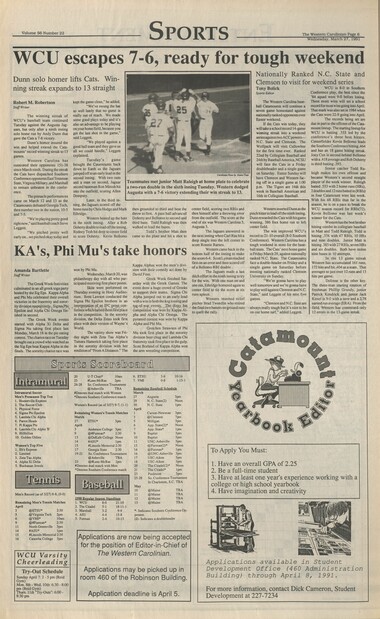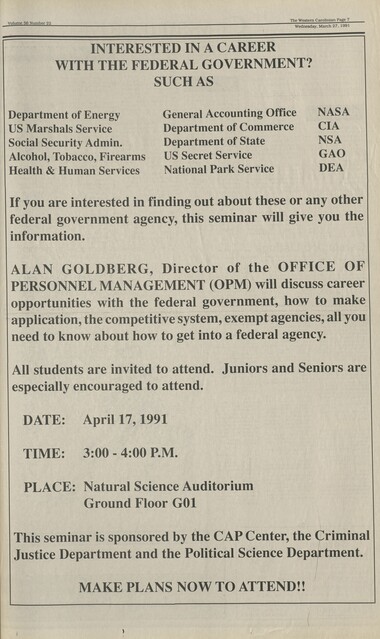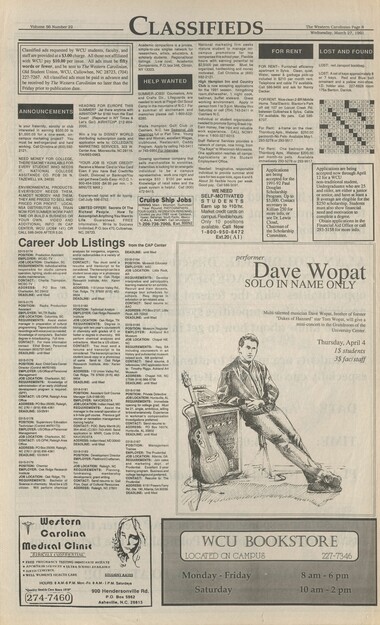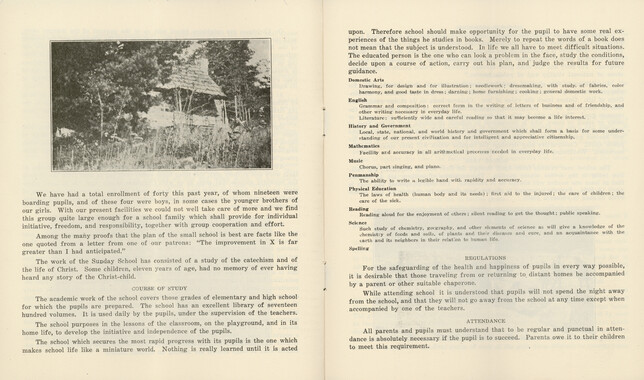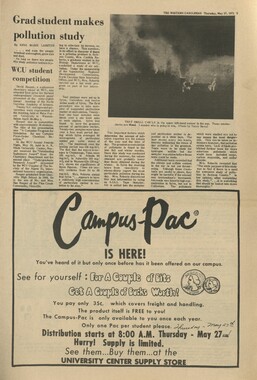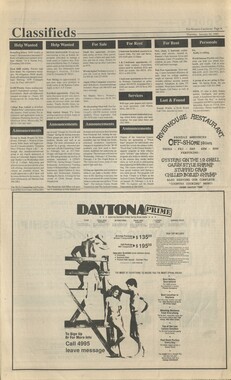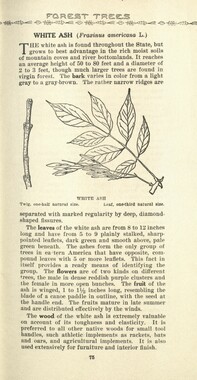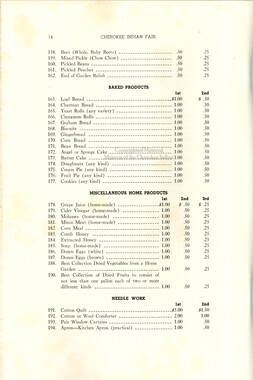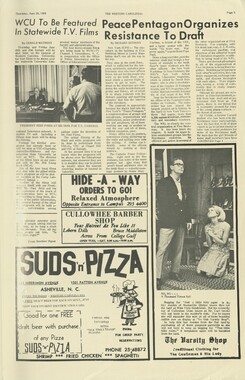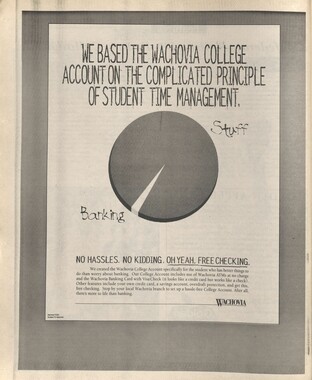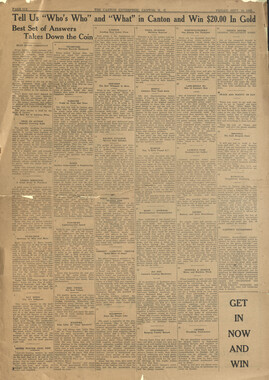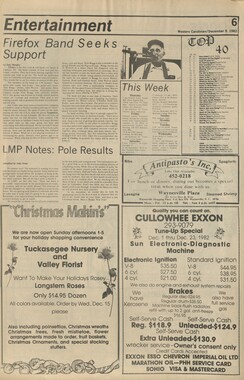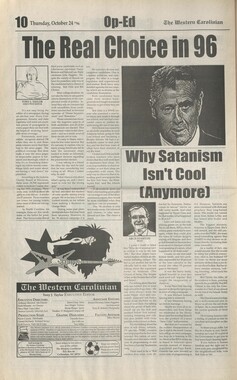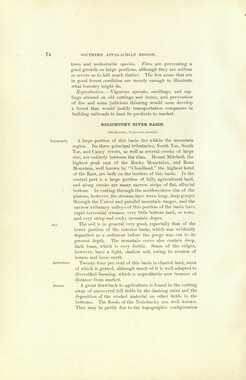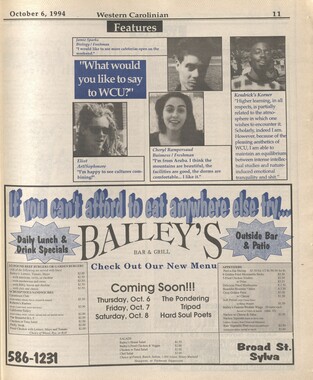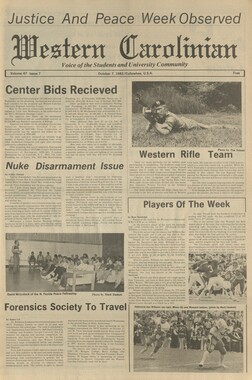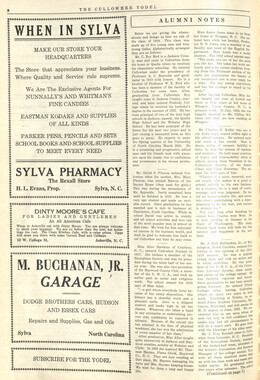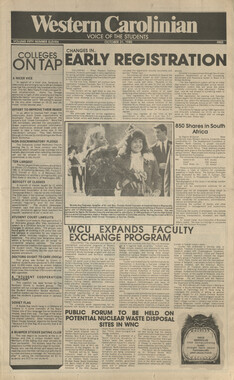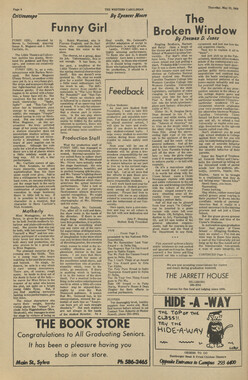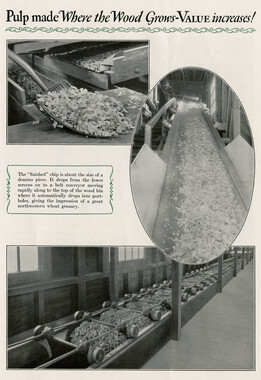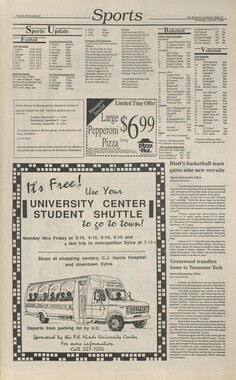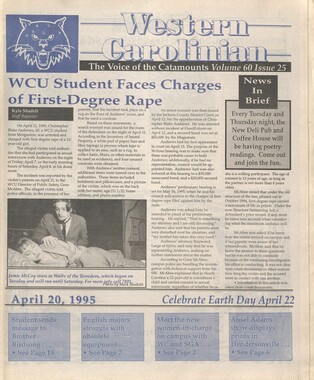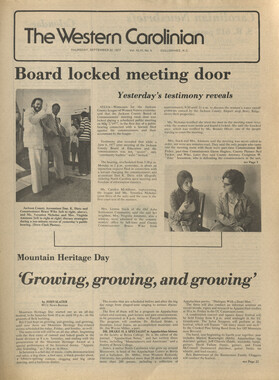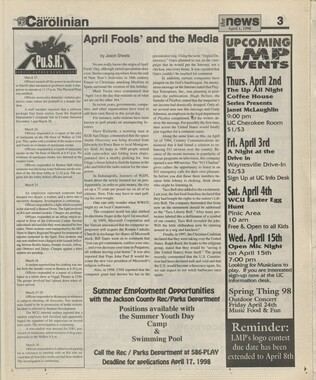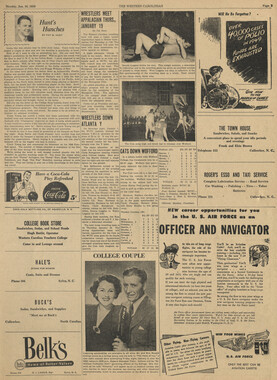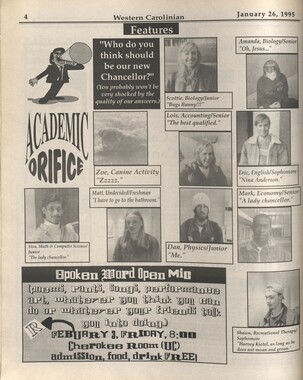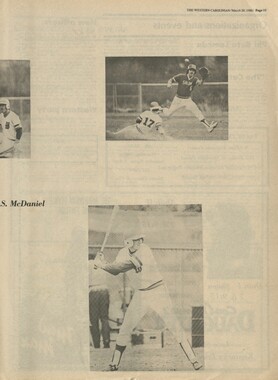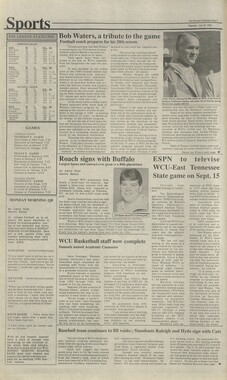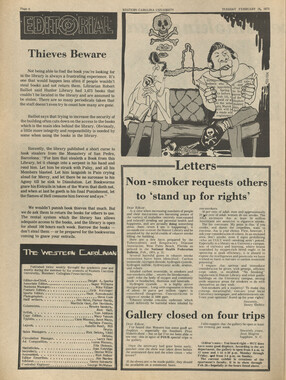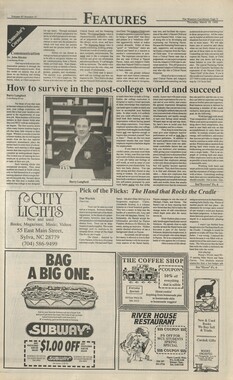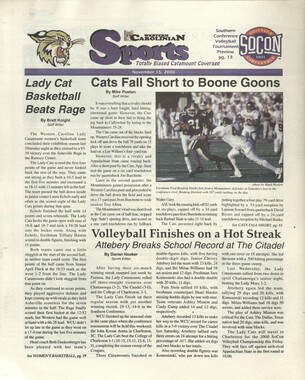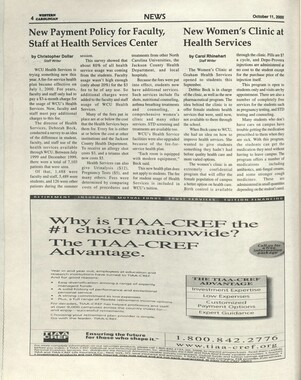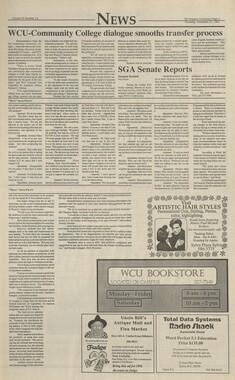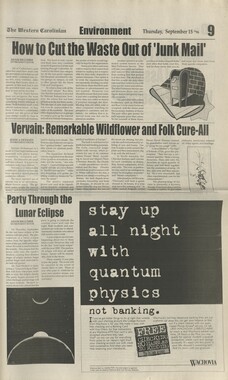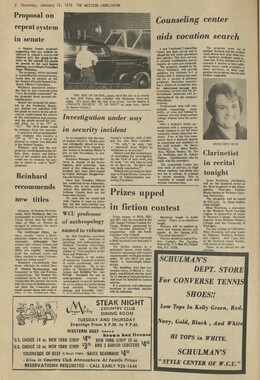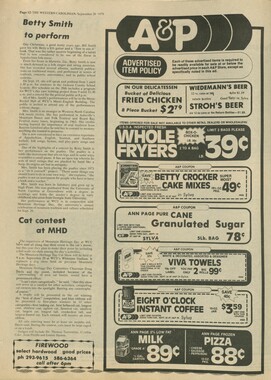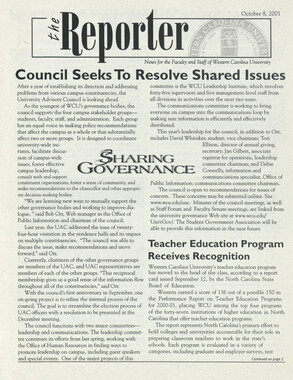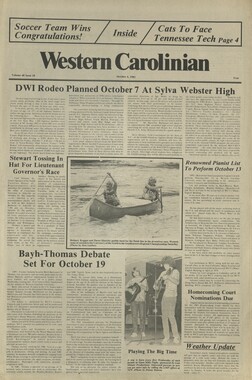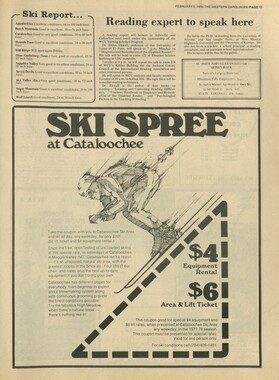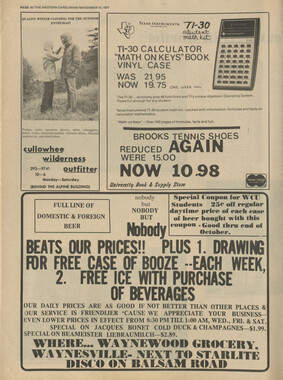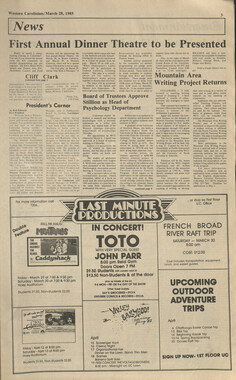Western Carolina University (20)
View all
- Canton Champion Fibre Company (2308)
- Cherokee Traditions (292)
- Civil War in Southern Appalachia (165)
- Craft Revival (1942)
- Great Smoky Mountains - A Park for America (2766)
- Highlights from Western Carolina University (430)
- Horace Kephart (941)
- Journeys Through Jackson (154)
- LGBTQIA+ Archive of Jackson County (85)
- Oral Histories of Western North Carolina (314)
- Picturing Appalachia (6772)
- Stories of Mountain Folk (413)
- Travel Western North Carolina (160)
- Western Carolina University Fine Art Museum Vitreograph Collection (129)
- Western Carolina University Herbarium (92)
- Western Carolina University: Making Memories (708)
- Western Carolina University Publications (2283)
- Western Carolina University Restricted Electronic Theses and Dissertations (146)
- Western North Carolina Regional Maps (71)
- World War II in Southern Appalachia (131)
University of North Carolina Asheville (6)
View all
- Allanstand Cottage Industries (62)
- Appalachian National Park Association (53)
- Bennett, Kelly, 1890-1974 (1388)
- Berry, Walter (76)
- Brasstown Carvers (40)
- Carver, George Washington, 1864?-1943 (26)
- Cathey, Joseph, 1803-1874 (1)
- Champion Fibre Company (233)
- Champion Paper and Fibre Company (297)
- Cherokee Indian Fair Association (16)
- Cherokee Language Program (22)
- Crowe, Amanda (40)
- Edmonston, Thomas Benton, 1842-1907 (7)
- Ensley, A. L. (Abraham Lincoln), 1865-1948 (275)
- Fromer, Irving Rhodes, 1913-1994 (70)
- George Butz (BFS 1907) (46)
- Goodrich, Frances Louisa (120)
- Grant, George Alexander, 1891-1964 (96)
- Heard, Marian Gladys (60)
- Kephart, Calvin, 1883-1969 (15)
- Kephart, Horace, 1862-1931 (313)
- Kephart, Laura, 1862-1954 (39)
- Laney, Gideon Thomas, 1889-1976 (439)
- Masa, George, 1881-1933 (61)
- McElhinney, William Julian, 1896-1953 (44)
- Niggli, Josephina, 1910-1983 (10)
- North Carolina Park Commission (105)
- Osborne, Kezia Stradley (9)
- Owens, Samuel Robert, 1918-1995 (11)
- Penland Weavers and Potters (36)
- Roberts, Vivienne (15)
- Roth, Albert, 1890-1974 (142)
- Schenck, Carl Alwin, 1868-1955 (1)
- Sherrill's Photography Studio (2565)
- Southern Highland Handicraft Guild (127)
- Southern Highlanders, Inc. (71)
- Stalcup, Jesse Bryson (46)
- Stearns, I. K. (213)
- Thompson, James Edward, 1880-1976 (226)
- United States. Indian Arts and Crafts Board (130)
- USFS (683)
- Vance, Zebulon Baird, 1830-1894 (1)
- Weaver, Zebulon, 1872-1948 (58)
- Western Carolina College (230)
- Western Carolina Teachers College (282)
- Western Carolina University (1794)
- Western Carolina University. Mountain Heritage Center (18)
- Whitman, Walt, 1819-1892 (10)
- Wilburn, Hiram Coleman, 1880-1967 (73)
- Williams, Isadora (3)
- Cain, Doreyl Ammons (0)
- Crittenden, Lorraine (0)
- Rhodes, Judy (0)
- Smith, Edward Clark (0)
- Appalachian Region, Southern (2569)
- Asheville (N.C.) (1923)
- Avery County (N.C.) (26)
- Blount County (Tenn.) (161)
- Buncombe County (N.C.) (1672)
- Cherokee County (N.C.) (283)
- Clay County (N.C.) (555)
- Graham County (N.C.) (233)
- Great Smoky Mountains National Park (N.C. and Tenn.) (519)
- Haywood County (N.C.) (3524)
- Henderson County (N.C.) (70)
- Jackson County (N.C.) (4694)
- Knox County (Tenn.) (25)
- Knoxville (Tenn.) (12)
- Lake Santeetlah (N.C.) (10)
- Macon County (N.C.) (420)
- Madison County (N.C.) (212)
- McDowell County (N.C.) (39)
- Mitchell County (N.C.) (132)
- Polk County (N.C.) (35)
- Qualla Boundary (981)
- Rutherford County (N.C.) (76)
- Swain County (N.C.) (2115)
- Transylvania County (N.C.) (270)
- Watauga County (N.C.) (12)
- Waynesville (N.C.) (84)
- Yancey County (N.C.) (72)
- Aerial Photographs (3)
- Aerial Views (60)
- Albums (books) (4)
- Articles (1)
- Artifacts (object Genre) (228)
- Bibliographies (1)
- Biography (general Genre) (2)
- Cards (information Artifacts) (38)
- Clippings (information Artifacts) (191)
- Crafts (art Genres) (622)
- Depictions (visual Works) (21)
- Design Drawings (1)
- Drawings (visual Works) (184)
- Envelopes (73)
- Facsimiles (reproductions) (1)
- Fiction (general Genre) (4)
- Financial Records (12)
- Fliers (printed Matter) (67)
- Glass Plate Negatives (381)
- Guidebooks (2)
- Internegatives (10)
- Interviews (815)
- Land Surveys (102)
- Letters (correspondence) (1013)
- Manuscripts (documents) (618)
- Maps (documents) (177)
- Memorandums (25)
- Minutes (administrative Records) (59)
- Negatives (photographs) (5835)
- Newsletters (1285)
- Newspapers (2)
- Occupation Currency (1)
- Paintings (visual Works) (1)
- Pen And Ink Drawings (1)
- Periodicals (193)
- Personal Narratives (10)
- Photographs (12976)
- Plans (maps) (1)
- Poetry (6)
- Portraits (4533)
- Postcards (329)
- Programs (documents) (151)
- Publications (documents) (2236)
- Questionnaires (65)
- Scrapbooks (282)
- Sheet Music (2)
- Slides (photographs) (402)
- Songs (musical Compositions) (2)
- Sound Recordings (796)
- Specimens (92)
- Speeches (documents) (15)
- Tintypes (photographs) (8)
- Transcripts (322)
- Video Recordings (physical Artifacts) (23)
- Vitreographs (129)
- Text Messages (0)
- A.L. Ensley Collection (275)
- Appalachian Industrial School Records (7)
- Appalachian National Park Association Records (336)
- Axley-Meroney Collection (2)
- Bayard Wootten Photograph Collection (20)
- Bethel Rural Community Organization Collection (7)
- Blumer Collection (5)
- C.W. Slagle Collection (20)
- Canton Area Historical Museum (2110)
- Carlos C. Campbell Collection (282)
- Cataloochee History Project (64)
- Cherokee Studies Collection (4)
- Daisy Dame Photograph Album (5)
- Daniel Boone VI Collection (1)
- Doris Ulmann Photograph Collection (112)
- Elizabeth H. Lasley Collection (1)
- Elizabeth Woolworth Szold Fleharty Collection (4)
- Frank Fry Collection (95)
- George Masa Collection (173)
- Gideon Laney Collection (452)
- Hazel Scarborough Collection (2)
- Hiram C. Wilburn Papers (28)
- Historic Photographs Collection (236)
- Horace Kephart Collection (861)
- Humbard Collection (33)
- Hunter and Weaver Families Collection (1)
- I. D. Blumenthal Collection (4)
- Isadora Williams Collection (4)
- Jesse Bryson Stalcup Collection (47)
- Jim Thompson Collection (224)
- John B. Battle Collection (7)
- John C. Campbell Folk School Records (80)
- John Parris Collection (6)
- Judaculla Rock project (2)
- Kelly Bennett Collection (1407)
- Love Family Papers (11)
- Major Wiley Parris Civil War Letters (3)
- Map Collection (12)
- McFee-Misemer Civil War Letters (34)
- Mountain Heritage Center Collection (4)
- Norburn - Robertson - Thomson Families Collection (44)
- Pauline Hood Collection (7)
- Pre-Guild Collection (2)
- Qualla Arts and Crafts Mutual Collection (12)
- R.A. Romanes Collection (681)
- Rosser H. Taylor Collection (1)
- Samuel Robert Owens Collection (94)
- Sara Madison Collection (144)
- Sherrill Studio Photo Collection (2558)
- Smoky Mountains Hiking Club Collection (616)
- Stories of Mountain Folk - Radio Programs (374)
- The Reporter, Western Carolina University (510)
- Venoy and Elizabeth Reed Collection (16)
- WCU Gender and Sexuality Oral History Project (32)
- WCU Mountain Heritage Center Oral Histories (25)
- WCU Oral History Collection - Mountain People, Mountain Lives (71)
- WCU Students Newspapers Collection (1744)
- Western North Carolina Tomorrow Black Oral History Project (69)
- William Williams Stringfield Collection (2)
- Zebulon Weaver Collection (109)
- African Americans (390)
- Appalachian Trail (35)
- Artisans (521)
- Cherokee art (84)
- Cherokee artists -- North Carolina (10)
- Cherokee language (21)
- Cherokee pottery (101)
- Cherokee women (208)
- Church buildings (170)
- Civilian Conservation Corps (U.S.) (110)
- College student newspapers and periodicals (1830)
- Dams (107)
- Dance (1023)
- Education (222)
- Floods (61)
- Folk music (1015)
- Forced removal, 1813-1903 (2)
- Forest conservation (220)
- Forests and forestry (1184)
- Gender nonconformity (4)
- Great Smoky Mountains National Park (N.C. and Tenn.) (181)
- Hunting (38)
- Landscape photography (25)
- Logging (118)
- Maps (83)
- Mines and mineral resources (8)
- North Carolina -- Maps (18)
- Paper industry (38)
- Postcards (255)
- Pottery (135)
- Railroad trains (71)
- Rural electrification -- North Carolina, Western (3)
- School integration -- Southern States (2)
- Segregation -- North Carolina, Western (5)
- Slavery (5)
- Sports (452)
- Storytelling (244)
- Waterfalls -- Great Smoky Mountains (N.C. and Tenn.) (66)
- Weaving -- Appalachian Region, Southern (280)
- Wood-carving -- Appalachian Region, Southern (328)
- World War, 1939-1945 (173)
Western Carolinian Volume 56 Number 22
Item
Item’s are ‘child’ level descriptions to ‘parent’ objects, (e.g. one page of a whole book).
-
-
Volume 56 Number 22 Features ti,., w^tern Carolinian Page 4 Wednesday. March 21, 1991 " Crisis: Myth and Reality Suzanne Rountree Contributing Writer "Just as one man's meat is another man's poison, one man's crisis may be another man' s ordinary train of events." Generally, crisis is thought of as an overwhelming experience that creates emergency in a person's Notice!! Application forms for the position of VVWCU-FM General Manager for the 1991-1992 academic year will be available from the office secretary daily until the due date, April 5,1991 at 5:00pm. Anyone interested in the position may contact Michael Jones, General Manager, VVWCU-FM during regularly posted office hours. Application forms may be picked up at WVVCU-FM radio station In Moore Building during the General Manager's office hours. Questions regarding the selection process may be directed to Dr. Glenn Stillion, Vice-Chancellor for Student Development at 227-7147 or to Michael Jones, General Manager, WWCU-FM at 227-7174 or at 293-7114. life, and, often times carries with it the misconception that everyone perceives the events of life similarly. Maintaining this belief will inhibit therapeutic intervention and diminish the value of individual feelings and thoughts. As suggested by the opening quotation (Viney, 1976) theevent is not accountable for the crisis reaction, but rather one' s perception of the event. Several variables must be considered for clear understanding of a person in crisis: how the event is thought to disrupt the person's existence, and what other accumulative feelings have been aroused. Specifically, crisis results from a collection of life experiences and expectations. These determine how one reacts to the final snapping of a shoelace. It is not the shoelace that creates crisis, but rather the collective "straws that break the camel's back." Crisis is characterized by disorganization and a lack of equilibrium, vulnerability and reduced defensiveness, a breakdown in coping, and a definite beginning and end. Disorganization and disequilibrium are the most easily identifiable characteristics of crisis. They are associated with fatigue, difficulty in completing tasks, maintaining relationships, and accentuating feelings of helplessness, inadequacy, anxiety, and confusion. Reduced defensiveness results when the person feels that ev erything he held as important has been destroyed and nothing exists which has value. According to Taplin (1971) this is the turning point at which change, danger or opportunity are possible. Although a positive outcome can occur through crisis, there exist three other possibilities which lie in the danger zone: sustaining psychological damage, remaining the same or dying. Softness is the mind of a willow which turns the force of the wind against itself. Suppleness is the way to be strong exquisite utility. Learn, thus, its This Japanese ode reflects the option of positive resolution to internal devastation. It is the process of working through, integrating and using crisis for personal gain. Common to all people in crisis is an inability to solve problems which results from a breakdown in coping skills. Most often previous ways of coping are inadequate to satisfy crisis needs. Many times the person experiencing life during this time feels unaole to solve problems associated with new circumstances. The coping mechanism breaks down during evaluation of the event. Questions that are being asked internally by the person in crisis are, "What do I have to lose and how will it affect me?" and "What can I do to change what is happening?" Breakdown occurs when the answers are not evident. Finally, crisis has a beginning and an end. Though some researchers provide information of cases that last up to six months, most agree that four to six weeks is typical because humans are intolerant of disruption for long periods of time. Though most are short lived, crisis due to a loss from death can take years. Generally, the negative intense feelings and accompanying physical symptoms associated with crisis are short-term, and healthy outcomes depend on intervention. If you are experiencing crisis, explore resources and use them. Counseling & Psychological Services is located in 114 Scott and is open Monday-Friday, 8 a.m. - 5 p.m., telephone 227-7469. Some information used to create this article was taken from Crjsjs. Intervention: A Handbook fa pr^pce and Research bv Karl A. Slaikeu (1984). LMP schedules canoeing, climbing and repelling St. David's Episcopal Church Canterbury House w Sundays — 11 am Wednesdays — 5:30 pm A place of peace in a troubled world. Suzanne Kendall Staff Writer Last Minute Productions, WCU's student-led entertainment organization, is offering several outdoor adventures this semester. The trips are designed to give participants an opportunity to learn a new sport or to sharpen their skills. All trips are at a low cost to WCU students and faculty. A canoe/kayak clinic for beginners is scheduled for Saturday April 6. The group will begin the morning on Cedar Cliff Lake learning basic paddling, boating, and safety skills. That afternoon, participants will test their newly acquired skills on the Tuckaseigee River. Experienced guides will give instruction and lead the trip. The trip leaves the UC(first floor) at \ J- Speedwell Road, across from Ramsey Center 9:00 a.m. and will return around 4:00 p.m. The cost is $7.00 for WCU student or $16.00 for faculty orstaff. This includes lunch, equipment, guides, and transportation. Also scheduled for Saturday, April 6 is a climbing/repelling trip. This trip will provide both the beginner and the intermediate climbers with opportunities to develop or enhance their climbing skills. Experienced guides will give instruction on knots, safety procedures, and climbing etiquette. As the group progresses, they will attempt more difficult levels of climbing. The trip leaves the UC (first floor) at 8:00 a.m. and returns around 6:00 p.m. The cost is $7.00 for WCU students and $18.00 for faculty and staff. Lunch, climbing equipment, guides, and transportation are all included. A day hike to the Shining Rock Wilderness area is planned for Sunday, April 7. The group will hike along ridge tops that offer spectacular views as well as a playground of rock formations. The trip leaves the UC at 9:00 a.m. and will return around 4:00 p.m. The cost is $2.00 for WCU students or $5.00 for faculty and staff. The price includes lunch, guides, and transportation. Other outdoor adventures, including rafting, the Tuckaseigee River Clean-up, horseback riding, and an Intercollegiate Downriver Canoe Race, are planned for April. Space on all trips is limited so sign up in advance at the University Center's Administrative offices between 8:00 a.m. and 5:00 p.m.. For more information call 227- 7206. On April 20 there is going to be an Intercollegiate Downriver Canoe Race on the Tuckaseegee River near campus. Anyone interested in participating in this event should attend a pre-race meeting April lat5:00p.m.in the Catamout Room located on the second floor of the University Center. The Western Carolina Canoe Team will hold practices every Tuesday and Thursdayat3:30 p.m. at the dam in Cullowhee. Everyone is welcome to attend practices, no matter what your level of paddling experience. For more information on this adventure program or any other, call Charles Chancellor at227-7206 or Ken Howie at 227-7479. The University Center's Outdoor Rental office rents a wide variety of outdoor equipment. The Outdoor Rental office is located on the third floor of the UC and spring semester operating hours are 2:00 p.m. to 6:00 p.m. Monday, Thursday, and Friday. The Outdoor Committee will hold its next meeting Monday, April 8 at 5:00 p.m. in the Catamount Room located on the second floor of the UC. Plans for the fall semester will begin. Members are encouraged to help plan, organize, and lead LMP outdoor adventures. For more information call 227- 7479. Tips for planet Earth ® ® ® ® Diane MacEachern Washington Post Writers Group Q. My refrigerator is about ten years old. Should junk it for a more energy-efficient model—and add to the piles of waste in our landfills? Or do I continue to use the refrigerator but waste energy and contribute to global warming? A. According toRickHeede.senior research associate with the Rocky Mountain Institute, the problem with junking the refrigerator you currently own has more to do with the chlorofluorocarbons (CFCs) contained in the cooling unit and refrigerator insulation than either shrinking landfill space or the amount of excess carbon dioxide gen- f& erated by an energy-wasting appliance. The cooling unit in a typical refrigerator contains about one-half pound of CFC12, a compound that, pound for pound, has fifteen thousand times the impact on global warming that carbon dioxide (C02) has. The foam insulation inside the refrigerator contains two pounds of CFC11, a compound that per pound is 20,000 times more potent than the same amount of C02. Old-style refrigerators use about 1,400 kilowatt-hours (kwh) per year of electricity. Each kwh consumed releases 1.86 poundsof carbon dioxide. Thus, running an inefficient refrigerator for a year can release 2,604 pounds of carbon dioxide into the atmosphere. Now suppose you junk your refrigerator, releasing its CFC11 and CFC12. The total global-warming impact of those CFCs is going to be on the order of twenty times greater than the C02 you release by running the appliance! So, to get back to your question: If you can afford it, buy a new energy-efficient refrigerator now. But instead of junking the old one, store it in your garage or shed until the technology is readily available to allow consumers to easily recycle it. If you do buy a new energy-efficient refrigerator, choose one that uses 240 kwh to 900 kwh per year. Even if your new refrig- eratoruses 700kwh annually, you'll save 700 kwh per year over the old one and reduce your C02 em issions by half. Send questions about the environment to Tips for Planet Earth, c/o Washington Post Writers Group, 1150 15th St NW, Washington, D.C. 20071-9200. Questions of general interest will be answered in the column; individual answers cannot be provided. RESERVE OFFICERS' TRAINING CORPS ?JW*ky,April4 is yoiffbexriclouies. for more irformation call 7206 or 7FXJN YOUR FIRST STEP TOWARD SUCCESS IS THE ONE YOU COULD TAKE THIS SUMMER. At Army ROTC Camp Challenge, you'll learn what it takes to succeed — in college and in life. You'll build self-confidence and develop your leadership potential. Plus you can also qualify to earn an Army Officer's commission when you graduate. Army ROTC Camp Challenge. It may be just what you need to reach the top. ARMY ROTC THE SMARTEST COLLEGE COURSE YOU CAN TAKE. Contact: LTC Michael Mountain Phone: 227-7648
Object
Object’s are ‘parent’ level descriptions to ‘children’ items, (e.g. a book with pages).
-
The Western Carolinian is Western Carolina University's student-run newspaper. The paper was published as the Cullowhee Yodel from 1924 to 1931 before changing its name to The Western Carolinian in 1933.
-
